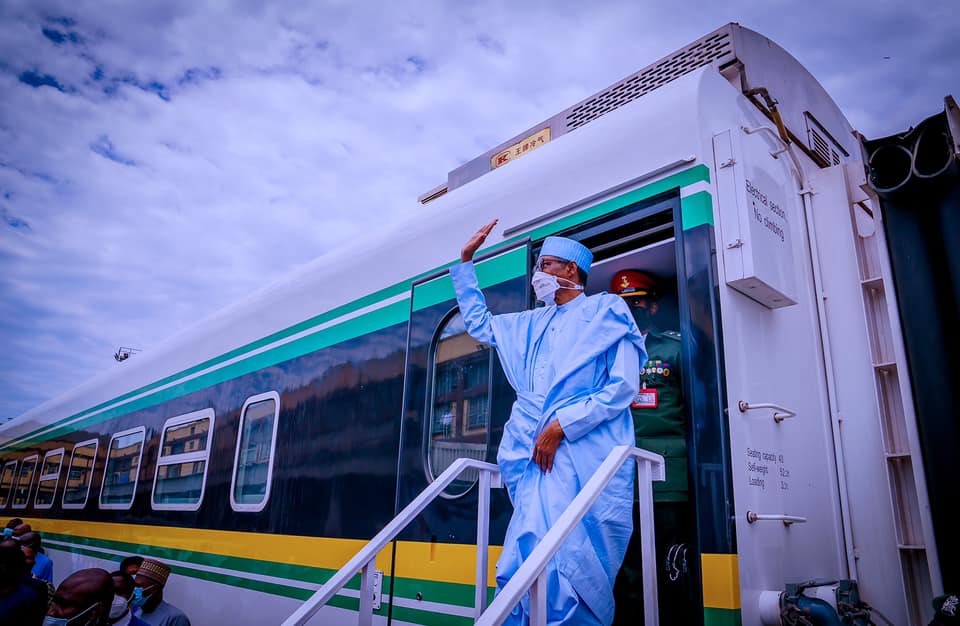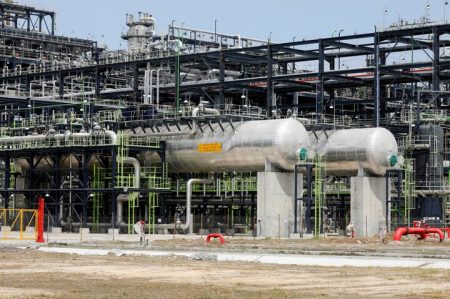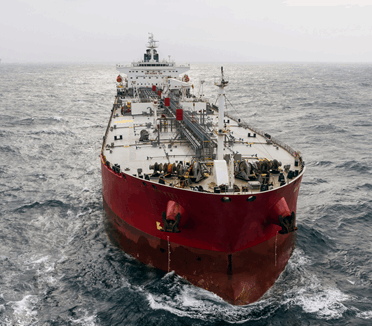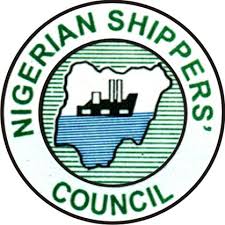
*Launches $195million Deep Blue project
Vincent Toritseju
Lagos — PRESIDENT Muhammadu Buhari, yesterday, flagged off the $1.5 billion Lagos-Ibadan standard gauge railway project with a projection that the project will create wealth and business opportunities.
Similarly, the President also said that the Integrated National Security and Waterways Protection Infrastructure otherwise known as the Deep Blue Sea maritime security project initiated by the Federal Ministry of Transport will guarantee maritime trade and checkmate the menace of pirates’ activities in the nation’s coastal and territorial waters.
The Lagos-Ibadan rail is the third to be commissioned by the President in the last five years. The other two were Kaduna-Kano and Itakpe-Warri rail lines.
The 157 kilometers Lagos-Ibadan rail line runs from Apapa Wharf in Lagos, through Ogun State and terminated in Ibadan, the Oyo State capital.
While inaugurating the rail line, President Muhammadu Buhari described it as another milestone in the drive to establish rail as a choice means of transportation for passengers and freight.

Shortly after he inaugurated the project, President Buhari took a ride from Ebute Metta Station to Energy Nature Light, ENL, Terminal, Apapa Port, Lagos.
The Speaker, House of Representatives, Femi Gbajabiamila; Governor Babajide Sanwo-Olu of Lagos State; governors of Ekiti, Oyo, Ogun and the Deputy Governor of Ondo, the Minister of Transportation, the Minister of State Transportation, Senator Gbemisola Saraki, other ministers and government officials joined him in the ride.
On the benefits of the Lagos-Ibadan rail and other ongoing railway projects, President Buhari said Ibadan-Kano project would have a connection to the Tin Can Island port as well as the West-East Coastal rail line from Lagos to Calabar linking Onitsha, Benin, Warri, Yenagoa, Port Harcourt, Aba and Uyo.
His words: “From the beginning of this administration, railway infrastructure development has been given the priority it deserves and various milestones have been reached.
“Right from when the Abuja-Kaduna railway was flagged off for commercial operation in 2016 to this Lagos-Ibadan railway project being commissioned today for full commercial operation.”
Buhari commended the Minister of Transportation, Rotimi Amaechi, and his team for their drive that led to a job well done.
He added: “This vital line establishes an end-to-end logistic supply chain in railway transport within its short corridor, Lagos-Ibadan, as goods to the hinterland would now be transported by rail directly from the Apapa Port quayside straight to the Inland Container Depot located in Ibadan from where it can be distributed to other parts of the country.
“In clear recognition of the challenges posed to our economic growth by absence of strong and effective infrastructure, we have in the rail sector, further to other ongoing railway infrastructure projects, embarked on the completion of the outstanding segment of the Lagos-Kano railway, which is Ibadan-Kano.
“The Lagos-Kano railway project when completed will link the Kano-Maradi line at Kano and a rail link from the Nigeria southern ports of Lagos to Maradi in Niger Republic will be achieved.
“The connection through rail would position Nigerian ports as the choice for import and export business of the people of landlocked Niger Republic.
“This would be beneficial to the economy through employment from new business opportunities and wealth creation.”
Earlier, Amaechi thanked President Buhari for the courage to take the China loan to execute the rail project.
He also thanked the Chinese government for the loan and expressed optimism that China would approve the loan for the Ibadan-Kano axis.
Amaechi recognised the cooperation of Lagos, Ogun and Oyo state governments, adding that over 1,000 houses were demolished in Ogun State alone in the course of the construction.
Our financing model yielding results
Buhari expressed optimism that the financing model adopted by his administration to fund the development of critical infrastructure in the country is yielding fruits.
Describing the $1.5bn mega project “as another milestone in the drive of this administration to revitalize the railway system and establish it as a choice mode of transportation for both passengers and freight,” the President pledged the readiness of his administration to continue to prioritize the development of the rail sector until the expiration of his second term in 2023.
“My directive to the Federal Ministry of Transportation and Ministry of Finance on reaching financial agreements with appropriate co-financiers to partner with the federal government for the development of the Ibadan – Kano railway is yielding results,” he said.
On the benefits of the Lagos-Ibadan corridor as well as other on-going railway projects across the country, President Buhari said, ‘‘this vital line establishes an end-to-end logistic supply chain in railway transport within its short corridor, Lagos – Ibadan, as goods to the hinterland would now be transported by rail directly from the Apapa port Quayside straight to the Inland Container Depot located in Ibadan from where it can be distributed to other parts of the country.
‘‘In clear recognition of the challenges posed to our economic growth by absence of strong and effective infrastructure, we have in the rail sector, further to other ongoing railway infrastructure projects, embarked on the completion of the outstanding segment of the Lagos – Kano railway, which is Ibadan – Kano.
‘‘The Lagos – Kano railway project when completed will link the Kano – Maradi line at Kano and a rail link from the Nigeria southern ports of Lagos to Maradi in Niger Republic will be achieved.
‘‘The connection through rail would position Nigerian ports as the choice for import and export business of the people of landlocked Niger Republic.
‘‘This would be beneficial to the economy through employment from new business opportunities and wealth creation.’’
He further noted that the Ibadan-Kano project would have a connection to the Tin Can Island port as well as the West – East Coastal rail line from Lagos to Calabar linking Onitsha, Benin, Warri, Yenagoa, Port Harcourt, Aba and Uyo.
‘‘From the beginning of this administration, railway infrastructure development has been given the priority it deserves and various milestones have been reached, right from when the Abuja – Kaduna railway was flagged-off for commercial operation in 2016 to this Lagos – Ibadan railway project being commissioned today (Thursday) for full commercial operation,’’ he said.
Commending the Minister of Transportation, Rotimi Amaechi, for his drive and tenacity in the completion of the project, the President commended the ‘‘wonderful team in the Ministry’’ for a job well done.
Shortly after he inaugurated the project, President Buhari took a ride from Ebute Metta Station to Energy Nature Light (ENL), Terminal, Apapa Port, Lagos.
I’m deaf to criticisms- Amaechi
Minister of Transportation, Rotimi Amaechi, accompanied by his wife, Judith, lauded Buhari saying “this is the third time Mr. President is commissioning a standard gauge, completed by him. We met a forest and I lost a car. I brought you here to show the naysayers that you started this project and completed it. Without the support of Mr. President, it would not have been impossible to do this.”
On how the Ministry under his watch was able to pull the feat, Amaechi said he does not listen to criticisms because they often come from politicians who lost out in the power game.
“I don’t listen to criticisms because most of them come from politicians who have lost power. When politicians are in power, they stop criticisms. Let history judge us,” he said
He thanked the governors of Lagos, Oyo and Ogun states for their support during the construction of the project.
He also thanked ex-governor of Ogun state, Ibikunle Amosun for allowing the demolition of 1000 houses to enable the construction of the railway complex in Ogun state.
As a recognition of the invaluable roles played to the development of the country in one form or the other, the federal government according to Amaechi decided to name the train stations after prominent Nigerians including Mobolaji Johnson, Bola Tinubu, Yemi Osinbajo, Babatunde Fashola, Funmilayo Ransome-Kuti, Wole Soyinka, Segun Osogba amongst others.
Lagos state governor, Babajide Sanwo-Olu who spoke on behalf of the governors of Lagos, Ogun and Oyo states, praised the sincerity of President Muhammadu Buhari, saying, “We have benefited immensely from your administration. We are delighted to see an administration start and finished a project within the life of that administration. It is a testament to what is possible when a national and sub-national governments cooperate on a common ground.
“Our collective efforts have not been vain. The corridor between Lagos and Ogun is arguably the most important in this country. Oyo state is home to dry inland plant and Ogun state houses the Assembly plants at Kajola.
“On our part in Lagos, we are ready to key into the national transportation master plan. We are building six train terminals along this corridor. We are entering a new era of rail transportation under the watch of President Muhammadu Buhari. We thank Mr. President for setting a new standard for infrastructural development in Nigeria.
Security will enhance maritime trade
On the Maritime security architecture, Buhari said that the maritime security arrangement under scores Nigeria’s commitment to the framework and the resources and cooperation with other nations in
He said: “This is being initiated to foster the maritime security architecture and ensure real time within Nigerian waters and beyond.
“This is coming at a critical time when global discussions are centered on piracy activities in the Gulf of Guinea region.
“Therefore the flag off of the deep blue sea project marks an important milestone in this regards in our collective effort to tackle security challenges in the form of piracy and maritime crimes in Nigeria and the Gulf of Guinea.
“It is also a demonstration of government of strong commitment to ensuring security, this intervention will no doubt facilitate a conducive environment for the maritime sector to strive and contribute to the diversification of the Nigerian economy.
“Deep blue project is a critical step towards the realization of maritime security in the region which underscores Nigeria’s commitment in providing the necessary framework and resources and cooperation with other nations in maritime business.
“I am confident that the project will enhance maritime domain awareness and improve law enforcement. I wish to assure you of government commitment to ensure the sustainability of the project.”
Similarly, the Minister of Transportation disclosed that he met stiff opposition when he first initiated the Deep Blue project as criminals who were feeding fat from the insecurity on the nation’s territorial and coastal waters vehemently moved against the project.
He also said that about 600 military and civilian personnel have been trained to man the equipment on both land and sea.
The equipment include two special mission vessels, three special mission helicopters, 16 Armoured Vehicles, two special mission aircrafts, 17 interceptor boats four Unmanned Aerial Vehicles and Control, Command, Control, Communications, computers, and intelligence operation center based in Lagos.
Amaechi disclosed that with the full deployment to the equipment, the issue of war surcharges that were being slammed on Nigerian bound cargoes will be removed by the international shipping companies.
IMO’s Secretary General commends Nigeria
Meanwhile the Secretary General of the International Maritime Organization, IMO has commended Nigeria for taking the initiative by the deployment of the Deep Blue project equipment to tackle piracy in the Gulf of Guinea saying that security will enhance trade within the region.
There were goodwill messages from Ibrahim Alhassan, Chairman, Board of the Nigerian Railway Corporation, NRC, Jiang Yigao,
Chairman, China Civil Engineering Construction Company, CCECC and Cui Jianchum, Ambassador Extraordinary and Plenipotentiary of the People’s Republic of China to the Federal Republic of Nigeria.
Prominent citizens who attended the event include Governors Babajide Sanwo-Olu, Kayode Fayemi, Dapo Abiodun and Seyi Makinde, of Lagos, Ekiti, Ogun and Oyo states respectively.
Also in attendance were Speaker of the House of Representatives, Femi Gbajabiamila, Senator Oluremi Tinubu and Nobel laureate Professor Wole Soyinka, among others.



